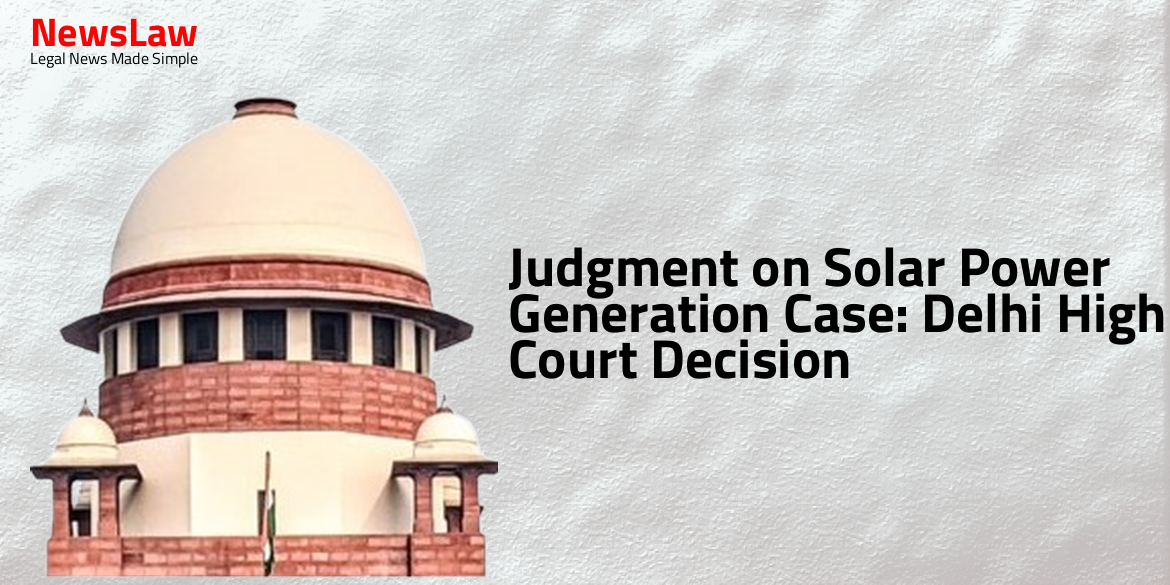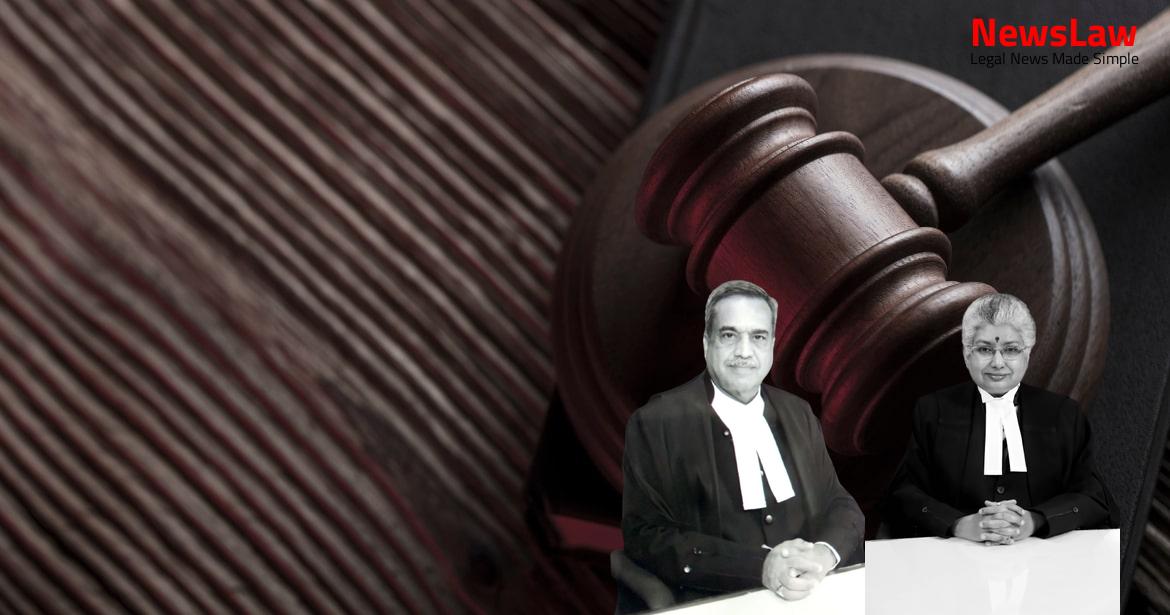In a recent ruling, the Delhi High Court pronounced a significant judgment in the case concerning solar power generation. The decision will have far-reaching implications for the industry and stakeholders involved. Stay informed as we delve into the details of this crucial legal battle.
Facts
- The petitioners have challenged the validity of the Central Board of Indirect Taxes and Customs Instruction dated 09 July 2022, referred to as the ‘impugned Instruction’, issued under Section 151A of the Customs Act, 1962.
- The Instruction pertains to the warehousing of imported capital goods used in solar power generation and the alleged inapplicability of the Manufacture and other Operations in Warehouse (No.2) Regulations, 2019.
- Various Show Cause Notices were issued to the petitioners in connection with the impugned Instruction, questioning the validity of their warehousing licenses under the MOOWR Regulations.
- In one case (W.P.(C) 12386/2022), a letter dated 23 August 2022 required a provisional duty bond for the release of imported goods.
- In another case (W.P.(C) 10838/2022), the petitioner challenged the validity of a letter dated 19 July 2022 that cancelled their warehouse license.
- The petitioners contest the implementation of the impugned Instruction and seek to explain why their warehousing licenses should not be revoked.
- Imposition of BCD in 2022-23 led to a reduction in imports overall.
- However, there was an increase in the import of solar modules in 2023-24.
- The data on import of solar modules is encapsulated in a chart showing Capacity Addition, Imports in Rs Cr, and Imports in GW.
Issue
- The main issue to be examined is whether the Circular issued by the respondents amounts to a revenue legislation for imposing excise duty.
- Another question is whether the suits must be related to the recovery of possession of immovable property in Greater Bombay to satisfy the third condition.
- It is important to determine if Section 37B of the Act is applicable and if it necessitates the reproduction of Section 37-B.
- The central issue is the application of the dominant purpose test or the theory of apportionment in interpreting Section 14-A of the Act.
- The dispute revolves around the interpretation of the phrase ‘in relation to’ concerning the earning of dividend income on shares despite the initial purpose for investing not being dividend-earning.
Arguments
- The petitioner contended that the grant of a license under the MOOWR Regulations should be considered a judicial act.
- Cancellation of a license was argued to also be viewed as a judicial act, requiring an inquiry and investigation in line with natural justice principles.
- The petitioner claimed that the cancellation of their license was invalid as they were not given the opportunity to clear their warehoused goods, as allowed under the Union Government’s policy.
- The Union Budget 2023-24 amended regulations to exclude solar power plants and projects from Project Imports.
- The petitioner’s counsel questioned the contention that capital goods must undergo manufacturing for Section 65 benefits, arguing that solar energy generation should qualify as manufacturing.
- The counsel also highlighted the lack of time limits set in Sections 61 and 65 regarding duty deferral.
- Quoting Supreme Court and High Court precedents, the petitioner’s counsel argued that authorities must act judicially and give parties a chance to present their case.
- The petitioner argued that goods like solar panels should be considered capital goods under Section 61, open to manufacturing benefits.
- The MOOWR Regulations were said not to exclude electricity generation from their scope.
- The petitioner challenged the stand that solar energy generation does not qualify as manufacturing under Section 65.
- The petitioner argued against the Instruction requiring cancellation of licenses, stating a breach of natural justice.
- The counsel emphasized the duty deferral benefits under MOOWR Regulations, emphasizing duty is paid only upon home consumption clearance.
- The petitioner contended that subjective satisfaction cannot be the basis for grant or cancellation of licenses, emphasizing a quasi-judicial approach.
- The petitioner’s counsel highlighted the importance of allowing solar power projects in the context of national energy goals.
- The counsel challenged the Instruction against solar power projects under the MOOWR Regulations, citing possible unfair advantages to domestic manufacturers.
- The petitioner contended that solar cells and panels were imported duty-free until tariff changes in 2022.
- The counsel argued that the Solar Energy projects were established legally and did not seek to circumvent duty payments.
- The counsel pointed out that solar cells qualify as capital goods, disputing the allegation that the petitioner misused the duty deferment system.
- The petitioner’s counsel argued that the MOOWR Regulations were first introduced in 1966 and cover a wide range of warehoused goods, not limited to raw materials only.
- The petitioner’s counsel cited circulars and notifications supporting the import of capital goods and machinery under the Act.
- The petitioner’s counsel emphasized the need for natural justice in license cancellation decisions and the importance of allowing the licensee to challenge allegations.
- The petitioner sought clarity on the scope of Section 65 and MOOWR Regulations, urging the Court to make a definitive ruling.
- The counsel pointed out the significance of addressing the issues raised in the petitions regarding solar power projects under the Act.
- The respondents argue that the phrase ‘in relation to such goods’ in Section 65 should be interpreted comprehensively based on context.
- They contend that the interpretation proposed by the petitioners is erroneous and should be rejected.
- The respondents assert that the impugned Instruction misconstrues the scheme of Sections 61 and 65 of the Act and the MOOWR Regulations.
- They emphasize that importers can bring capital goods into India for manufacturing processes or operations as per the regulations.
- The respondents point out that goods other than capital goods can be warehoused until consumption or clearance.
- They differentiate between direct and indirect participation in relation to the manufacture of goods.
- The respondents highlight the cancellation of licenses in a specific case to support their argument.
- They stress on the distinction between ‘in relation to’ and ‘in manufacture of’ in the context of the Act.
- The argument regarding the phrase ‘in relation to such goods’ is challenged by the respondents.
- It is indicated that prior to April 1, 2022, solar cells and modules attracted ‘Nil’ Basic Customs Duty.
Analysis
- Licensee must remove goods from warehouse for export upon filing shipping bill or bill of export and affixing a one-time-lock.
- Licensee is required to record the goods removed from the warehouse.
- Goods cleared for home consumption must meet certain conditions and payment of duties.
- Section 47 deals with clearance of goods for home consumption based on risk evaluation.
- Section 48 outlines procedures for goods not cleared, warehoused, or transhipped within thirty days after unloading.
- Chapter VII of the Act pertains to clearance of imported and exported goods.
- Sections 61 and 65 of the Act govern the period for which goods may remain warehoused and manufacturing operations in a warehouse.
- Section 151A empowers the Board to issue orders for achieving uniformity in the classification of goods and duty levy.
- Cancellation of license may occur if licensee contravenes Act provisions or license conditions.
- MOOWR Regulations set conditions for operating warehouses and permissions.
- Regulation 5 grants permission to operate under the MOOWR Regulations.
- Regulation 10 empowers exemption of certain goods from regulation provisions.
- Regulation 11 governs the receipt of goods from another warehouse.
- Section 65A, although not enforced, mandates payment of certain taxes for goods in relation to manufacturing process or operations.
- Movement of goods between warehouses is regulated by Regulation 11 and 13.
- Regulation 14 and 15 outline removal of resultant goods for home consumption or export.
- Section 61 post-amendment states the period for goods to remain in the warehouse.
- Section 65 allows manufacturing and other operations in relation to goods in a warehouse.
- Section 15 determines the rate of duty and valuation of imported goods.
- Cancellation of license can be done if provisions are contravened or conditions breached.
- Power to cancel license granted to the Principal Commissioner of Customs or Commissioner of Customs.
- Section 58B empowers cancellation of license for contraventions or breaches by the licensee.
- The Court emphasized that quasi judicial functions should not be influenced by administrative considerations or directions issued by superiors.
- The circular issued by the executive, which was held to be contrary to section 37B of the Central Excise Act, was not binding on the adjudicating authority.
- The Court highlighted that the significance of the term ‘in relation to’ depends on the context in which it is used and should not be construed restrictively.
- The Court urged that the judge’s duty is to interpret and apply the law as enacted by the legislature, without engaging in judicial legislation or modifying express legislative language.
- Recreating or reassembling Section 65 to exclude a particular category of activity is wholly incorrect.
- Provisional bond for release of goods in relation to solar power generation under Section 65 was raised as an additional issue.
- Remedial measures can be adopted if solar power generation negatively impacts local generators or distorts the ‘level playing field’.
- The Court cannot deploy purposive interpretation to correct perceived anomalies in solar power generation under Section 65.
- Policies related to the impact of solar power generation on local industry cannot be a basis for reconstructing a statutory provision.
- Introduction of a condition of ineligibility cannot be justified through statutory interpretation.
Decision
- The Board’s Instruction mandating review of existing licenses and follow-up action has been quashed.
- Detailed orders were passed on 04 August 2023 in a related matter.
- The stay on the operation of the impugned Show Cause Notice was confirmed on 26 August 2022.
- The writ petitions have been allowed based on the reasons provided.
- No further observations are deemed necessary.
- The amendment application assailing the Show Cause Notice was moved by the petitioner.
- W.P.(C) 12386/2022 shall stand at 179.
- Parties to proceed in accordance with the directions issued on this batch.
Case Title: AVAADA MH SUSTAINABLE PVT LTD Vs. CENTRAL BOARD OF INDIRECT TAXES AND CUSTOMS & ORS. (2024:DHC:3615-DB)
Case Number: W.P.(C)-10838/2022



